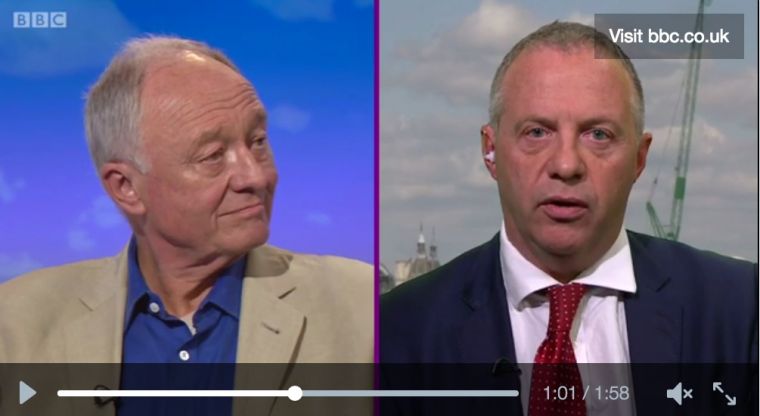Labour's antisemitism nightmare: Why there's something strangely hopeful about it

The depressing thing about the Labour antisemitism row is that, in 2016, it's still possible to have it.
The heartening thing is that it's a row.
Antisemitism is poisonous, a truly evil manifestation of the darkest instincts of fallen human nature. It never quite goes away; as Conor Cruise O'Brien said, it's a very light sleeper. But the crucial difference between antisemitism before the Second World War and antisemitism after it is that people thought it was normal to hate Jews. Antisemitism was in the social and cultural air we breathed. You can see it in TS Eliot, in GK Chesterton, in vile confected panics about the "swarms" of diseased refugees from Russian pogroms that would overwhelm us if we weren't careful; it was just how it was. Now it isn't, and if someone posts a comment or makes a remark that sounds antisemitic the reaction is panicked denial. Today, no one would willingly admit to being an antisemite.
That's why the row currently engulfing Labour is so toxic. Veteran Labour stalwart Ken Livingstone has just been suspended after an attempted defence of Naseem Shah on the grounds that Hitler was briefly in favour of sending Jews to Palestine before he "went mad and ended up killing 6 million Jews" backfired spectacularly. It led to a vitriolic attacks from Labour MP John Mann, chair of the all-party parliamentary group on antisemitism, who accused him of being a "Nazi apologist" (and is being investigated by his chief whip for his behaviour) and shadow Commons leader Chris Bryant, who told the House of Commons he was "sick and tired" of people trying to explain away antisemitism, adding: "Yes, I'm talking to you, Ken Livingstone."
It's right Ken livingstone is suspended. As I said this am he's been explaining away anti-Semitism for far too long. I hope he's expelled.
— Chris Bryant MP (@RhonddaBryant) April 28, 2016
Blazing row outside BBC newsroom between Ken Livingstone and John Mann over anti semitism
— norman smith (@BBCNormanS) April 28, 2016
Shah herself, MP for Bradford West, was forced to make a humiliating apology after being found to have shared a post on social media advocating the removal of all Israeli Jews to the US. The "transportation costs" would be less than three years of US defence spending, she explained brightly: "Problem solved!" She also used the hashtag #IsraelApartheid above a quote saying "Never forget that everything Hitler did in Germany was legal". The apology was not enough; she was suspended too.

It's too late to solve Labour's image problem. Lord Levy, Tony Blair's former fundraiser, has warned Labour has a serious problem with antisemitism, which he believes is more common on the left than on the right. Of Shah, he said he was left "scratching his head with despair as to how people like this can enter our parliament with such a lack of knowledge, discretion and sensitivity". Crossbencher Baroness Neuberger has echoed his concerns; she said the problem was "attached to Jeremy Corbyn becoming leader", and added that it was "an issue with the hard left".
As I write, the dust is still flying and there is very little clarity about who is to blame for what. But here are some of the issues in play.
1. The left is more likely than the right to be deeply critical of Israeli policies toward Palestinians. They see the settlements, the wall, the Palestinians' poverty and the systematic discrimination and they are, entirely understandably, outraged. Many of them have chosen their side. Not all of them consider the stories from the other side. Legitimate criticism of Israel overbalances into illegitimate criticism of Jews. While in the case of other ethnicities this might not matter so much – think of France/French or Germany/Germans – in the case of Jews, it really does. They don't think they're being antisemitic, but when they use language stupidly, they are.
2. This applies to Ken Livingstone. It is not really clear what point he was trying to make. But his bizarre reference to Hitler's flirtation with resettling Jews in Palestine is so utterly offensive that it places him unquestionably on the wrong side of this discourse. Public figures cannot say things like that and expect to get away with it. It's right that he has been suspended and if this means the end of his political career he cannot really complain.
3. Similarly, it was inexcusable for Naseem Shah to make the comments she did. She was clearly, as Lord Levy said, deeply ignorant about the Holocaust and for that there is no excuse. Perhaps it was her enthusiasm for the Palestinian cause that led to her to say what she did, but that's no excuse either; we should be able to have confidence that anyone who aspires to elected office is able to treat their political opponents with respect and understanding.
4. Both Shah and Livingstone have attempted to distance themselves from accusations of antisemitism and refocus discussion on the evils of Israel's occupation of Palestinian territory. Their astounding ineptitude and the gross inappropriateness of their remarks has made this impossible. Supporters of Zionism are frequently accused of playing the antisemitism card whenever Israel is criticised. They can now say, "We told you so."
5. While Labour is quite capable of shipwrecking itself without help from the Conservatives, the Tories were happy to help. David Cameron called for Shah's suspension after the news of her indiscretion became public, and it would be naive to think he was motivated entirely by virtuous indignation at what she said. Labour is not doing nearly as badly as pundits predicted, and this is a political gift to its opponents.
It's not too soon to learn some lessons.
First: what's at issue is not the classical antisemitism of the late 19th and early 20th centuries, with its lazy assumptions of a "Jewish question". People who say antisemitic things now are in general not using the term in precisely the same way, though the vocabulary of the past throws a long shadow. The Palestine issue has become entangled with how Jews are seen today, because Israel is a de facto Jewish state and the Jewish homeland. No matter what their own opinions on the question, in the eyes of modern antisemites Jews are somehow implicated in what the government of Israel does – and that's wrong.
So our politicians need to be fanatical about distinguishing between Israel and Jews. They need to be wearisomely careful not to say or think one when they mean the other.
Second: it can't be assumed that every politician understands the Holocaust or the long history of antisemitism. The Holocaust is receding into the distant past and in a few years all the survivors will be dead. MPs are not elected as historians but as citizens. Everyone ought to know all about the Holocaust; in fact most people know a few facts and a number, 6 million. That is not the same as feeling the true force of what was done to a whole people, and without an understanding of that it isn't possible to understand the Israel/Palestine question. There's a serious argument for making it compulsory for MPs to be trained in spotting antisemitic attitudes, not only in other people but in themselves. Without that we will have more Naseem Shahs.
Third: it ought to be possible to understand that both sides in this argument – those who fanatically support the Palestinians and those who lift the cry of antisemitism – are motivated by the same desire. It's the desire for justice, and each is appalled by what they perceive as the injustice experienced by the side they support. Ultimately, the sort of trench warfare that we've seen today, with insults lobbed across a no man's land of misunderstanding, doesn't advance justice for either side – and certainly not for both.
Fourth: there are lessons here for evangelical Christians. Especially in the US, there's a tendency for Christians to pick sides too, and Christian Zionism is particularly strong there. But Christians shouldn't be taking sides with anyone. We shouldn't approve of all that Israel does just because it's Israel, any more than we should excuse everything that Palestinians do if we believe they are oppressed. It's about justice for everyone. Everyone should be treated with dignity and respect, because everyone is a child of God.
It has not been British politics' finest hour. But there is still something hopeful about it. Everyone recoils with horror from being thought an antisemite, and that's an advance. People get genuinely angry, and that's a rebuke to the cynics who don't believe in politics or politicians. Real things get talked about. We discover that our political leaders care about something other than their careers. Even those who say unbelievably stupid things are probably not bad people underneath.
Follow Mark Woods on Twitter: @RevMarkWoods











